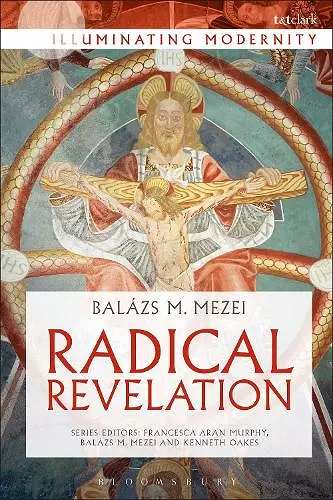Radical Revelation
Professor Balázs M Mezei author
Format:Hardback
Publisher:Bloomsbury Publishing PLC
Published:30th Nov '17
Currently unavailable, and unfortunately no date known when it will be back

Offers a comprehensive theological and philosophical understanding of the notion of divine revelation.
This volume offers a practical and innovative interpretation of divine revelation, from a philosophical-theological perspective. Balázs M. Mezei outlines the most important presuppositions of our notion of divine revelation in a historic and semantic setting, as well as elaborating upon the methodology of model analysis. He then introduces and analyses the notion of self-revelation as the most important modern understanding of divine revelation; and presents the notion of “apocalyptic personhood” as a corollary of radical personhood, which is further developed into apocalyptic phenomenology.
Mezei further examines the remarkable development of some of the most important notions in the history of Christianity, along with the homogenous infrastructure of these notions in the very essence of the religion: the doctrine of Trinity. Covering aspects of revelation from semantics to historical and cognitive origins, and engaging with a wide variety of texts – including Augustine, Thomas Aquinas and Joseph Ratzinger – Mezei makes a strong and clear statement when explaining what the radical revelation is, how it can be understood and its overall importance.
The great strength of Radical Revelation is its breadth of enquiry ... [Mezei] deftly bridges arbitrary academic divides, such as those between analytical and continental forms of philosophy, while consistently making use of a wide range of artistic, musical, architectural and literary works as sources with which to illustrate his account of revelation. * Theology *
The work represents a great achievement in the systematic philosophical articulation of revelation. * Scottish Journal of Theology *
This is an excellent philosophical exploration of revelation, in dialogue with traditional theological sources as well as continuing perplexities that have been posed in recent centuries. It ranges widely in a manner that is philosophically and theologically engaging. It is very helpful is articulating the question(s) of revelation in their modern and contemporary forms. In a constructive spirit it offers a non-standard radical philosophical theology which approaches revelation as a rich or paradigmatic fact, one which has been and continues to be a living source of reflection. The writing is lucid in its offering of well-considered arguments that draw the reader into continuing engagement with the theme. While neither in the phenomenological nor the analytical traditions, it is significantly conversant with both, yet it develops its own distinctive philosophical account of revelation. An admirable work whose impressive scholarship and thoughtfulness is warmly recommended. * William Desmond, Villanova University, USA *
This book utilizes what is best in phenomenology, hermeneutics and cultural-political modes of philosophy, while showing familiarity with analytic philosophy. Undoubtedly erudite, unquestionably methodologically sophisticated to the nth degree, in the end the book is entirely original and offers a breath taking synthetic performance, opening up an extraordinarily hospitable relation between philosophy and theology. * Cyril O’Regan, University of Notre Dame, USA *
While philosophical theology may be indifferent to personal belief, radical philosophical theology explicates such belief and personal reception of revelation as a fact. Balázs Mezei analyzes philosophically revelation, which theology as a discipline presupposes. If it is at all meaningful to speak of revelation, then revelation must be real, unavoidable, inimitable, and inevitably self-referential. In employing a variety of philosophical methods, this book opens the eyes to what Christian practice is doing: analytical method clarifies the usage and intentions of standard terms; historical method brings century old debates to life, such as Platonism and German Idealism; phenomenology conveys the reality of concepts like ‘radical’ or ‘kenosis’ (self-emptying of the divine). It was Enlightenment with its dismissal of the sources and modes of divine revelation, i.e., the basics of Christian religion, which yielded a philosophy of the concept of revelation as such. Mezei’s study unveils the irony that the demise of revelation in Enlightenment critique was itself a kenosis. * Paul Richard Blum, Loyola University Maryland, USA *
ISBN: 9780567677785
Dimensions: unknown
Weight: 713g
384 pages